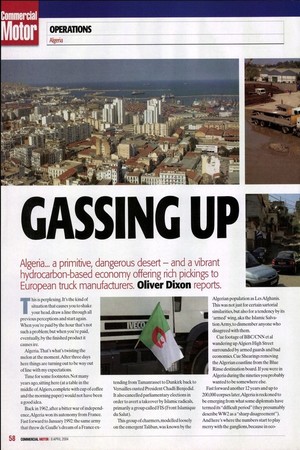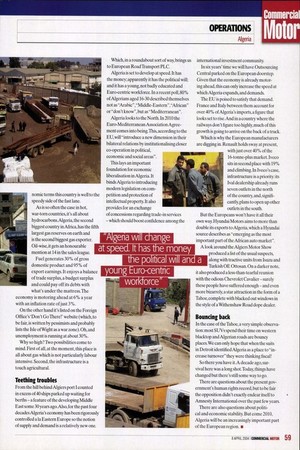GASS NGUP 1
Page 58

Page 59

If you've noticed an error in this article please click here to report it so we can fix it.
Algeria... a primitive, dangerous desert — and a vibrant hydrocarbon-based economy offering rich pickings to
European truck manufacturers. Oliver Dixon reports.
This is perplexing. It's the kind of situation that causes you to shake your head, draw a line through all previous perceptions and start again. When you're paid by the hour that's not such a problem; but when you're paid, eventually, by the finished product it causes ire.
Algeria.That's what's twisting the melon at the moment.After three days here things are turning out to be way out of line with my expectations.
Tune for some footnotes. Not many years ago, sitting here (at a table in the middle of Algiers, complete with cup of coffee and the morning paper) would not have been a good idea. Back in 1962, after a bitter war of independence,Algeria won its autonomy from France. Fast forward to January 1992: the same army that threw de Gaulle's dream of a France ex
tending from Tamanrasset to Dunkirk back to Versailles ousted President Chadli Benjedid. It also cancelled parliamentary elections in order to avert a takeover by Islamic radicals, primarily a group called FIS (Front Islamique du Salut). This group of charmers, modelled loosely on the emergent Taliban, was known by the
Algerian population as Les Afghanis. This was not just for certain sartorial similarities, but also for a tendency by its 'armed' wing, aka the Islamic Salvation Army, to dismember anyone who disagreed with them.
Cue footage of BBC/CNN et al wandering up Algiers High Street surrounded by armed guards and bad economics. Cue Shearings removing the Algerian coastline from the Blue Rinse destination board. If you were in Algeria during the nineties you probably wanted to be somewhere else. Fast forward another 12 years and up to 200,000 corpses later,Algeria is reckoned to be emerging from what some diplomats have termed its "difficult period" (they presumably describe WW2 as a "sharp disagreement"). And here's where the numbers start to play merry with the ganglions, because in eco
nomic terms this country is well to the speedy side of the fast lane.
As is so often the case in hot, war-torn countries, it's all about hydrocarbons. Algeria, the second biggest country in Africa, has the fifth largest gas reserves on earth and is the second biggest gas exporter. Oil-wise, it gets an honourable mention at 14 in the sales league. Fuel generates 30% of gross domestic product and 95% of export earnings. It enjoys a balance of trade surplus, a budget surplus and could pay off its debts with what's under the mattress. The
economy is motoring ahead at 6% a year with an inflation rate of just 3%.
On the other hand it's listed on the Foreign Office's 'Don't Go There!' website (which, to be fair, is written by pessimists and probably lists the Isle of Wight as a war zone). Oh, and unemployment is running at about 30%.
Why so high? Two possibilities come to mind. First of all, at the moment, this place is all about gas which is not particularly labour intensive. Second, the infrastructure is a touch agricultural. Teething troubles
From the hill behind Algiers port I counted in excess of 40 ships parked up waiting for berths — a feature of the developing Middle East some 30 years ago. Also, for the past four decades Algeria's economy has been rigorously controlled a la Eastern Europe so the notion of supply and demand is a relatively new one.
Which, in a roundabout sort of way, brings us to European Road Transport PLC.
Algeria is set to develop at speed. It has the money; apparently it has the political will; and it has a young, not badly educated and Euro-centric workforce. In a recent poll, 80% of Algerians aged 16-30 described themselves not as "Arabic","Middle-Eastern","African" or "don't know", but as "Mediterranean". Algeria looks to the North. In 2010 the Euro-Mediterranean Association Agreement comes into being.This, according to the EU, will "introduce a new dimension in their bilateral relations by institutionalising closer
co-operation in political, economic and social areas". This lays an important foundation for economic liberalisation in Algeria. It binds Algeria to introducing modern legislation on competition and protection of intellectual property. It also provides for an exchange of concessions regarding trade-in services — which should boost confidence among the
international investment community.
In six years' time we will have Outsourcing Central parked on the European doorstep. Given that the economy is already motoring ahead, this can only increase the speed at which Algeria expands, and demands.
The EU is poised to satisfy that demand. France and Italy between them account for over 40% of Algeria's imports, a figure that looks set to rise. And in a country where the railways don't figure too highly, much of this growth is going to arrive on the back of a truck. Which is why the European manufacturers are digging in. Renault holds sway at present,
with just over 40% of the 16-tonne-plus market. Iveco sits in second place with 19% and climbing. In Iveco's case, infrastructure is a priority: its Ival dealership already runs seven outlets in the north of the country, and, significantly, plans to open up other outlets in the south.
But the Europeans won't have it all their own way. Hyundai Motors aims to more than double its exports to Algeria, which a Hyundai source describes as "emerging as the most important part of the African auto market".
A look around the Algiers Motor Show produced a list of the usual suspects, along with tractive units from Isuzu and Turkish OE Ottosan. On a darker note, it also produced a less-than-tearful reunion with the odious Chevrolet Cavalier—surely these people have suffered enough — and even more bizarrely, a star attraction in the form of a Tahoe, complete with blacked out windows in the style of a Withenshaw Road dope dealer. a Bouncing back
In the case of the Tahoe, a very simple observation: most SUVs spend their time on western blacktop and Algerian roads are bouncy places.We can only hope that when the suits in Detroit identified Algeria as a place to "increase turnover" they were thinking fiscal!
So there you have it.A decade ago, survival here was a long shot.Today, things have changed but there's still some way to go.
There are questions about the present government's human rights record, but to be fair the opposition didn't exactly endear itself to Amnesty International over the past few years.
There are also questions about political and economic stability. But come 2010, Algeria will be an increasingly important part of the European region.






































































































